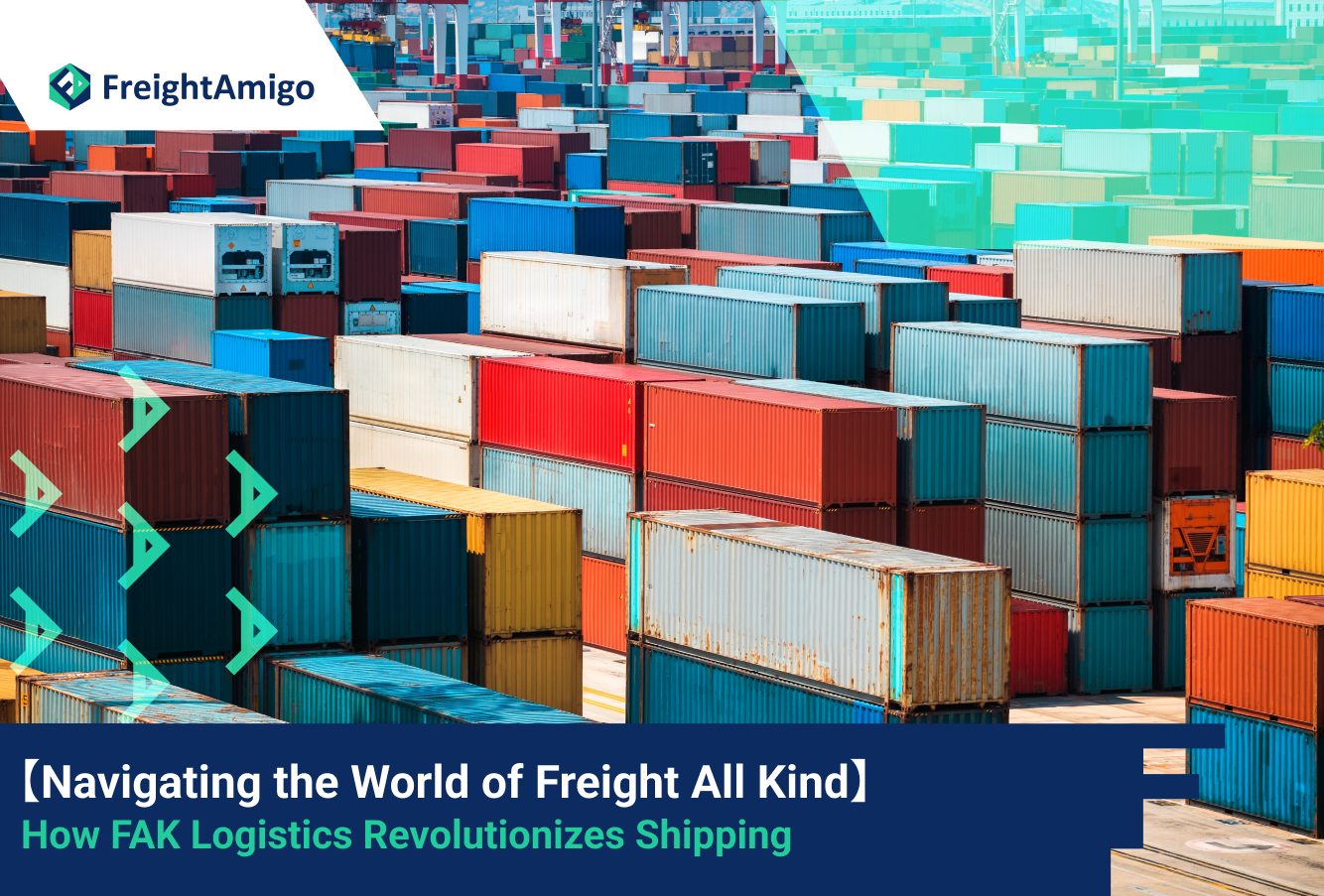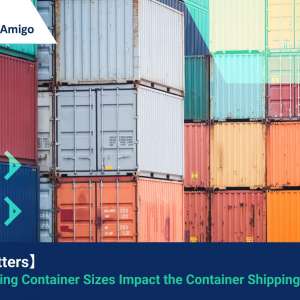Author Name: Tiffany Lee – Marketing Analyst at FreightAmigo
Understanding FAK Logistics in Shipping
Freight All Kind (FAK) is a term commonly used in the shipping and logistics industry to refer to a shipping strategy that consolidates various types of cargo into a single shipment. This approach allows shippers to streamline their logistics processes and optimize their shipping costs. FAK logistics is based on the concept of grouping diverse freight items together, regardless of their individual characteristics, to benefit from collective pricing and more efficient transportation methods.
The use of FAK logistics enables shippers to simplify their shipping operations by treating different types of cargo as a single unit. This approach is particularly beneficial for businesses that deal with a wide range of products and need to transport them to various destinations. By employing FAK logistics, shippers can avoid the complexities associated with managing multiple shipments and instead focus on the overall efficiency of their transportation processes.
The implementation of FAK logistics in shipping involves the utilization of flexible pricing structures that are based on the total volume or weight of the combined cargo. This approach allows shippers to negotiate more favorable rates with carriers and achieve cost savings by consolidating their shipments. FAK rates are designed to provide shippers with pricing flexibility and cost predictability, contributing to a more streamlined and economical shipping process.
Want To Compare The Best Express, Air Freight, Sea Freight, Rail Freight & Trucking Rates So As To Have Better Control On Cost?
FAK Rates and How They Impact Shipping
FAK rates play a pivotal role in shaping the dynamics of the shipping industry. These rates are designed to offer shippers a simplified and cost-effective approach to transporting their goods. Unlike traditional shipping methods that rely on specific itemized pricing for different types of cargo, FAK rates provide a more streamlined and cohesive pricing structure based on the overall volume or weight of the combined shipments.
The impact of FAK rates on shipping is significant, as they enable shippers to optimize their transportation costs and achieve greater operational efficiency. By leveraging FAK rates, businesses can benefit from more predictable pricing and reduced administrative burdens associated with managing diverse shipments. This approach empowers shippers to make informed decisions regarding their shipping strategies and enhance their overall supply chain performance.
The utilization of FAK rates in shipping fosters collaboration between shippers and carriers, as it encourages a more harmonious and mutually beneficial approach to transportation. By aligning their interests through FAK rates, shippers and carriers can establish long-term partnerships that promote cost-effective and reliable shipping solutions. Ultimately, the impact of FAK rates extends beyond individual transactions and contributes to the overall sustainability and competitiveness of the shipping industry.
FIK FAK: The Evolution of Freight All Kinds
The concept of Freight All Kind (FAK) has evolved over time to accommodate the changing needs and complexities of the shipping and logistics landscape. The evolution of FAK, often referred to as FIK FAK, reflects the adaptability of this approach in addressing the diverse requirements of modern supply chains. FIK FAK represents a progressive and dynamic iteration of FAK logistics that encompasses advanced technologies, optimized processes, and enhanced collaboration among industry stakeholders.
The evolution of FIK FAK is driven by the continuous innovation and improvement of shipping practices, as well as the integration of cutting-edge technologies that enable more efficient and sustainable transportation solutions. This evolution has led to the development of sophisticated FAK logistics strategies that leverage data analytics, automation, and real-time tracking to optimize the movement of goods and enhance the overall visibility and control of shipments. As a result, FIK FAK has become synonymous with agility, adaptability, and responsiveness in the context of modern shipping operations.
The evolution of FIK FAK also underscores the importance of collaboration and partnership among shippers, carriers, and logistics service providers. This collaborative approach is essential for unlocking the full potential of FAK logistics and realizing its transformative impact on the shipping industry. By embracing the principles of FIK FAK, stakeholders across the supply chain can foster a culture of innovation, continuous improvement, and shared value creation, ultimately driving the evolution of shipping practices towards greater efficiency and sustainability.
Advantages of FAK Logistics in Shipping
The adoption of FAK logistics in shipping offers a multitude of advantages that contribute to the overall efficiency and cost-effectiveness of transportation processes. One of the primary advantages of FAK logistics is its ability to simplify the complexities associated with managing diverse types of cargo. By consolidating different items into a single shipment, shippers can streamline their logistics operations and reduce the administrative burden of handling multiple individual shipments.
Furthermore, FAK logistics enables shippers to benefit from more favorable pricing structures that are based on the collective volume or weight of the combined cargo. This approach allows businesses to negotiate competitive rates with carriers and achieve cost savings by optimizing their shipping processes. Additionally, FAK logistics provides shippers with greater flexibility in managing their transportation needs and responding to fluctuating market demands, ultimately enhancing their overall agility and responsiveness.
Another significant advantage of FAK logistics is its potential to enhance the overall visibility and control of shipments. By consolidating diverse cargo into a single unit, shippers can gain better insights into the movement of their goods and implement more effective tracking and monitoring mechanisms. This heightened visibility contributes to improved supply chain management, risk mitigation, and customer satisfaction, as it enables shippers to proactively address potential issues and optimize the delivery of goods to their intended destinations.
FAK Logistics and Supply Chain Management
The integration of FAK logistics into supply chain management represents a strategic approach to optimizing the movement of goods and enhancing the overall efficiency of logistics operations. FAK logistics aligns with the broader objectives of supply chain management by offering shippers a more streamlined and cost-effective approach to transporting their products. This integration enables businesses to leverage the benefits of FAK logistics to drive improvements across various facets of their supply chain, including inventory management, order fulfillment, and distribution.
By incorporating FAK logistics into their supply chain management strategies, businesses can achieve greater operational agility and responsiveness to market dynamics. This approach empowers shippers to adapt to changing demand patterns, optimize their transportation costs, and enhance their overall competitiveness in the marketplace. Additionally, the integration of FAK logistics into supply chain management fosters greater collaboration and partnership between shippers, carriers, and logistics service providers, leading to more synchronized and harmonious logistics operations.
Furthermore, FAK logistics contributes to the optimization of inventory management and warehousing practices within the supply chain. By consolidating diverse cargo into a single shipment, businesses can reduce the need for excessive inventory storage and minimize the associated carrying costs. This approach enhances the overall efficiency of inventory management and enables businesses to achieve better utilization of their storage facilities, ultimately contributing to cost savings and improved supply chain performance.
FAK Logistics Best Practices
The successful implementation of FAK logistics relies on the adherence to best practices that are designed to maximize the benefits of this approach and optimize the overall efficiency of shipping operations. One of the key best practices in FAK logistics is the adoption of advanced technologies and digital solutions that enable shippers to automate and streamline their transportation processes. By leveraging data analytics, real-time tracking, and integrated management systems, businesses can enhance the visibility, control, and optimization of their shipments, ultimately driving greater efficiency and reliability.
Another critical best practice in FAK logistics is the establishment of strong partnerships and collaborative relationships with carriers and logistics service providers. By fostering open communication, trust, and mutual understanding, shippers can build resilient and sustainable partnerships that support the seamless execution of FAK logistics strategies. These partnerships enable businesses to access a broader range of transportation options, negotiate competitive rates, and optimize their shipping processes to meet the evolving needs of their supply chains.
Additionally, the adoption of proactive risk management and contingency planning is essential in FAK logistics to mitigate potential disruptions and ensure the uninterrupted flow of goods. By identifying and addressing potential risks in advance, businesses can implement robust contingency plans that enable them to respond effectively to unforeseen events and maintain the continuity of their shipping operations. This proactive approach to risk management enhances the resilience and reliability of FAK logistics, ultimately contributing to the overall sustainability and competitiveness of shipping practices.
How FAK Logistics Revolutionizes Shipping
FAK logistics revolutionizes shipping by providing businesses with a transformative approach to managing their transportation needs and optimizing the movement of goods across the supply chain. This revolutionary impact is driven by the fundamental principles of FAK logistics, which focus on simplifying shipping processes, optimizing costs, and enhancing the overall visibility and control of shipments. By embracing FAK logistics, businesses can revolutionize their shipping operations and achieve sustained improvements in efficiency, reliability, and customer satisfaction.
One of the ways in which FAK logistics revolutionizes shipping is by enabling businesses to achieve greater cost predictability and control over their transportation expenses. By consolidating diverse cargo into a single shipment and negotiating competitive FAK rates with carriers, businesses can optimize their shipping costs and achieve more predictable pricing structures. This approach empowers businesses to make informed decisions regarding their shipping strategies, allocate their resources more effectively, and achieve greater cost savings over the long term.
Furthermore, FAK logistics revolutionizes shipping by fostering a culture of collaboration and partnership across the supply chain. By aligning the interests of shippers, carriers, and logistics service providers through FAK logistics principles, businesses can establish strong and mutually beneficial relationships that drive continuous improvement and innovation in shipping practices. This collaborative approach enhances the overall sustainability and competitiveness of the shipping industry, ultimately revolutionizing the dynamics of transportation and logistics operations.
Additionally, FAK logistics revolutionizes shipping by enhancing the overall visibility and control of shipments throughout the transportation process. By consolidating diverse cargo into a single unit and implementing advanced tracking and monitoring mechanisms, businesses can gain better insights into the movement of their goods and proactively address potential issues that may arise during transit. This heightened visibility contributes to improved supply chain management, risk mitigation, and customer satisfaction, ultimately revolutionizing the reliability and responsiveness of shipping operations.
FAK Logistics Services and Providers
The adoption of FAK logistics is supported by a diverse range of logistics service providers and carriers that offer specialized FAK logistics services to businesses seeking to optimize their shipping processes. These providers play a pivotal role in enabling businesses to leverage the benefits of FAK logistics and achieve sustained improvements in the efficiency and cost-effectiveness of their transportation operations. By partnering with reputable FAK logistics service providers, businesses can access a comprehensive suite of solutions tailored to their unique shipping needs.
FAK logistics service providers offer a wide array of services designed to streamline the transportation of diverse cargo and optimize the overall efficiency of shipping operations. These services encompass various aspects of FAK logistics, including freight consolidation, pricing optimization, transportation management, and real-time tracking. By leveraging the expertise and capabilities of FAK logistics service providers, businesses can enhance the visibility, control, and reliability of their shipments, ultimately driving greater operational efficiency and customer satisfaction.
The role of carriers in supporting FAK logistics is equally essential, as they play a critical role in providing businesses with reliable and cost-effective transportation options for their consolidated shipments. Carriers that specialize in FAK logistics offer businesses access to a diverse network of transportation resources and innovative solutions that optimize the movement of goods across the supply chain. By partnering with reputable carriers that embrace the principles of FAK logistics, businesses can achieve greater flexibility, predictability, and cost savings in their shipping processes.
Conclusion
In conclusion, FAK logistics represents a transformative approach to managing shipping and transportation operations, offering businesses a streamlined and cost-effective strategy for consolidating diverse cargo into a single shipment. The evolution of FAK logistics, from traditional FAK to the advanced principles of FIK FAK, reflects the adaptability of this approach in addressing the changing needs of modern supply chains. By embracing FAK logistics, businesses can revolutionize their shipping operations and achieve sustained improvements in efficiency, reliability, and customer satisfaction.
The advantages of FAK logistics, including simplified shipping processes, optimized costs, and enhanced visibility and control, contribute to the overall efficiency and competitiveness of transportation operations. The integration of FAK logistics into supply chain management enables businesses to achieve greater operational agility and responsiveness to market dynamics, ultimately driving continuous improvement and innovation in shipping practices. By partnering with reputable FAK logistics service providers and carriers, businesses can access a comprehensive suite of solutions tailored to their unique shipping needs, ultimately enhancing the overall efficiency and reliability of their transportation operations.
In light of these considerations, businesses seeking to optimize their shipping processes and achieve sustained improvements in transportation efficiency and cost-effectiveness should consider embracing the principles of FAK logistics. By leveraging the transformative impact of FAK logistics, businesses can revolutionize their shipping operations, drive continuous improvement and innovation, and achieve sustained success in the dynamic and competitive landscape of modern transportation and logistics.
There Are Different Options For Cargo Transportation. If You Want To Choose The Most Convenient And Suitable Solution, It Is Best To Have The Full Support Of Logistics Experts! If You Are Planning To Ship Goods Overseas, Please Go To The FreightAmigo Page For Inquiries.
===
Read More:
【Cosmetic Product Recycling】 A Guide to Sustainable Reverse Logistics
【Rise of Green Supply Chain】 Pioneering Sustainable Practices in Logistics
【ESG in Logistics】 How ESG Practices Drive Social Responsibility in Logistics
===
If you have any inquiries on logistics/supply chain, feel free to contact FreightAmigo now:
Chat with us online OR
Phone : +852 28121686
WhatsApp: +852 27467829









































